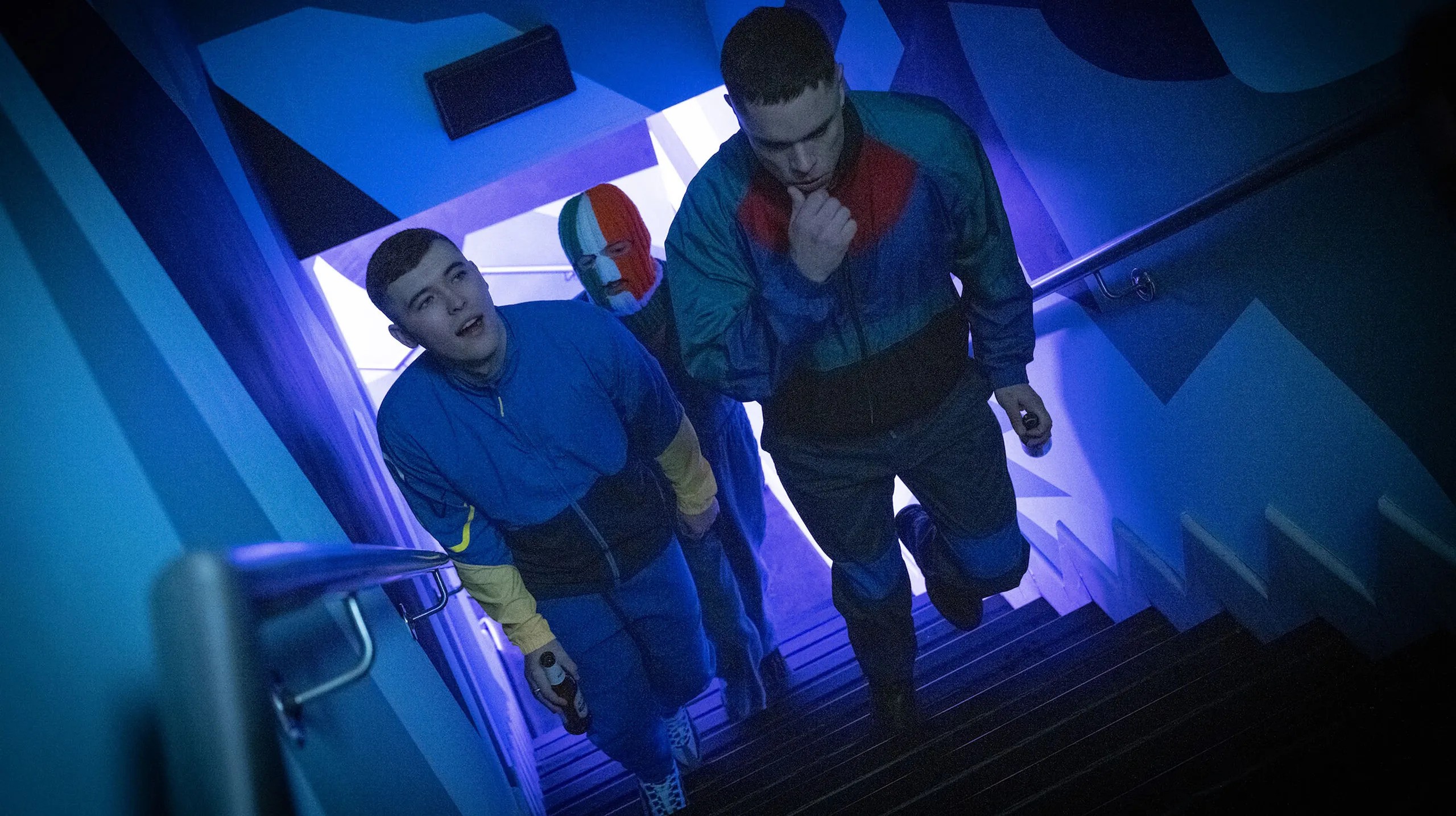Kneecap have a knack for self-mythologizing. Take, for example, the story of how they wrote the script for the pseudo-biopic that also bears their name: As told to Stereogum a few months back, the trio locked themselves in their apartment for three days straight, with nothing but a "crate of Guinness" and "Ireland's largest pizza" for sustenance, cranking out a heightened tale of their own origin story. As one might expect, the resulting movie has a kinetic energy, with Kneecap's three members — MCs Mo Chara and Móglaí Bap alongside DJ Próvaí — playing only slightly fictionalized versions of themselves. Across the film, the characters meet, make music, do a lot of drugs, run afoul of both conservative and radical figures in the north of Ireland's complex political landscape, and eventually make a name for themselves under the most implausible circumstances: representing daily life in West Belfast via rap music delivered in a feverish blend of English and Irish.
"Even though it was heightened in some senses, it was watered down in others," DJ Próvaí said of Kneecap in that same interview. "Sometimes real life is madder than what you can portray in a film." He's not exaggerating. Kneecap's story was itself already wild. The three met while working on a festival arranged around the Irish language; Mo Chara and Móglaí Bap were young artists, DJ Próvaí a schoolteacher. Early on they put together the single "Cearta," which caught on with young listeners in Belfast. It spurred the trio on. Soon, they became local iconoclasts in Belfast — where even speaking Irish could be seen as a political stance, let alone trying to modernize the language in the context of provocative rap music. The group stirred up plenty of controversy at the same time they garnered a lot of new listeners and plenty of acclaim. Their satire could rankle the northern establishment, at the same time that they earnestly unpacked the long-term ripple effects of the Troubles.
Along the way, the band would respond to outcries by saying it was all "fine art." That, in turn, became the title of their official label debut, the excellent album they dropped last month. Fine Art and Kneecap are symbiotic projects, a grand introduction to an insurgent, exhilarating, one-of-one type of act. The music has already started something in their native Ireland. (The album features guest appearances from other luminaries of contemporary Irish music, including Lankum's Radie Peat and Fontaines D.C.'s Grian Chatten.) Now, with a real-deal feature film riding on Sundance hype, Kneecap have brought their operation Stateside.
Like any story of musical ascension, there are some familiar tropes. But it's all turned on its head as Kneecap became a voice for a slice of Irish culture deeply under-represented on the global stage. Early on, one of the people who saw the potency of that story was director Rich Peppiatt. Way back in 2019, he approached the band and said he wanted to make a movie with them. They didn't quite believe him, and it took some convincing. Fast forward a bit, and Kneecap found themselves in that frenzied writing session, preparing to play themselves alongside established actors like Josie Walker, Simone Kirby, and Michael Fassbender.
In the beginning of Kneecap, we're introduced to Liam (Mo Chara) and Naoise (Móglaí Bap) as children, speaking Irish with Naoise's father Arlo (Fassbender). In the present, they're listless artists who haven't quite found their way, until a teacher comes across some of their rhymes and says they should make music together. Early gigs lead to "Cearta" going sneakily viral with the youth of Belfast, and soon Kneecap become a known entity around town — drawing the ire of both the police and the Radical Republicans Against Drugs. The movie maintains the careful balance struck in the group's music: loud and brash and hilarious and messy, but also viciously smart in how it frames contemporary Belfast politics and the day-to-day lives of the young Irish-speakers just trying to get by.
By the end, Kneecap is a portrait of a groundbreaking act coming into its own, but it's also a thinly veiled observation of the traumas passed on down through generations. Gonzo rap gigs unfold alongside familial reckonings. And throughout, there's a poignance underneath all of Kneecap's bombast: trying to reclaim a part of Irish identity through language, and to make it legible (and powerful) in the current day context.
Kneecap was the first-ever Irish-language film to show at Sundance this past January, where it ended up taking home the NEXT Audience Award. It isn't every day that a band makes a theatrical movie to accompany its album, let alone a debut album from an emergent act. But taken together, Fine Art and Kneecap aren't just wild rides in of themselves, but heartfelt portraits of and tributes to life in West Belfast. After years of overseas buzz, Kneecap is poised to take the group's story to people who have never heard anything like it.
Kneecap hits theaters via Sony Pictures Classics this Friday, 8/2. Get tickets here.





